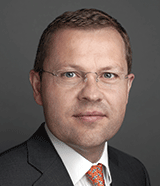Best global wealth manager: UBS Wealth Management
|
|
Also shortlisted: |
UBS Wealth Management has shown that overhauling the business works. Last year it produced its biggest profit since 2008, while the first quarter this year was also its best since 2008.
In 2014 the bank had the highest net inflows in Asia Pacific since 2007. And in the first quarter there were large inflows from Europe, where some ground had been lost.
Access intelligence that drives action
To unlock this research, enter your email to log in or enquire about access

